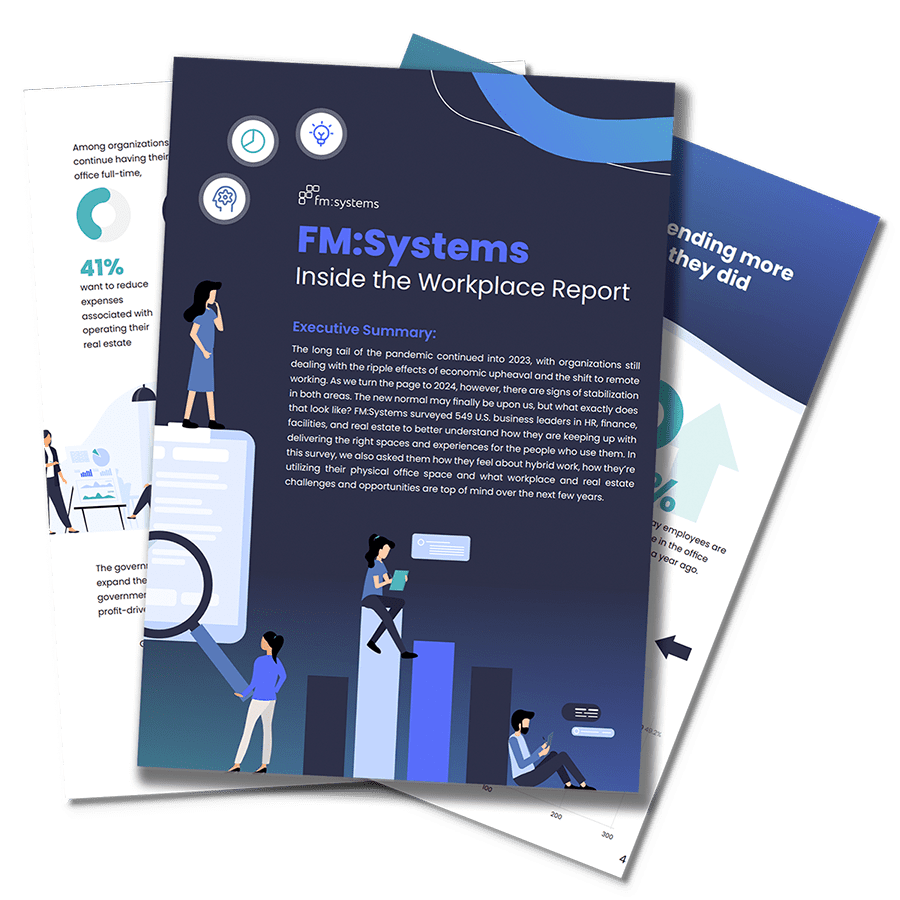4 Takeaways From the FM:Systems Inside the Workplace Report



As 2023 dawned, organizations were still grappling with conditions stemming from the pandemic. Economic uncertainty, alternative work arrangements, and a tight job market meant companies couldn’t really get back to business as usual. As we turn the page to 2024, however, there are signs of stabilization in these areas and smoother sailing ahead. The new normal may finally be upon us, but what exactly does that look like?
From mid-November to mid-December, FM:Systems surveyed 549 U.S. business leaders in facilities, real estate, finance, and HR to better understand how they are keeping up with delivering the right spaces and experiences for the people who use them. Here are four key findings from that survey.



1. Most companies are not content to just let remote or hybrid work models continue indefinitely
The pandemic lockdowns gave workers two things: The opportunity to take stock of their situations and the resources to make big life changes, like relocating and changing jobs – or even dropping out of the workforce entirely. Throughout the “Great Resignation” that followed, employers and their HR teams offered remote and hybrid working in order to stay competitive in a tight job market. With more people re-entering the workforce and fewer people voluntarily quitting, however, the employee/employer power dynamic may be shifting.
60%
of business leaders think employees should be in the office full-time within the next three years
Almost half
said workers are spending more time in the office now than they were a year ago
54%
(the majority) attributed the change to mandates from management
44%
of respondents credited initiatives to incent employees to spend more time in the office
2. Sustainability is a higher priority for organizations now than last year
Taking steps to address climate change has long been a matter of brand preservation and, more recently, talent retention and recruitment. The proliferation of regulations like NYC Local Law 97, as well as looming Securities and Exchange Commission sustainability reporting requirements, are compelling companies to ramp up and formalize their sustainability initiatives.



57%
of respondents reported that sustainability is more of a priority this year than at the same time in 2022
47%
(almost half) of organizations have established net zero or other sustainability goals and, of those, 91% are on track to achieve those goals
44%
of organizations that have established a net-zero goal, say that expanding their real estate footprint is their top priority. Only 25% of these respondents indicated that they are considering downsizing their portfolios



3. Adoption and use of workplace management solutions continues to expand
With the increased influence of sustainability on businesses of all kinds and the continued fluidity of work arrangements, more and more organizations are deploying workplace management solutions to help them navigate the changes
7 out of 10
organizations currently use a workplace management solution
Business leaders deploy workplace management solutions primarily to:
improve efficiency,




reduce costs,



and bolster security



Among organizations planning to implement workplace management solutions in the next year, most are focused on:
space management & planning,




workplace analytics,



and workplace sensors



4. Adoption of advanced technologies is especially high among organizations that plan to expand their real estate footprint
Expanding their real estate footprint over the next few years is a top priority for 35% of organizations, but many of these businesses are also looking to reduce expenses. Deploying advanced smart building tech may help them do both.



4 out of 5
currently use a workplace management solution
64%
plan to deploy generative AI to assist with operations and maintenance within the next year
Half
intend to deploy digital twin technology within the next year




